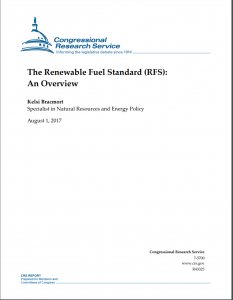Full Title: The Renewable Fuel Standard (RFS): An Overview
Author(s): Kelsi Bracmort
Publisher(s): Congressional Research Service
Publication Date: August 1, 2017
Full Text: Download Resource
Description (excerpt):
The Renewable Fuel Standard (RFS) requires U.S. transportation fuel to contain a minimum volume of biofuel. The RFS—established by the Energy Policy Act of 2005 (P.L. 109-58; EPAct05) and expanded in 2007 by the Energy Independence and Security Act (P.L. 110-140; EISA)—began with 4.0 billion gallons of renewable fuel in 2006 and aims to ascend to 36.0 billion gallons in 2022, with the Environmental Protection Agency (EPA) determining the volume amounts after 2022. However, it appears increasingly unlikely that the United States will meet the total renewable fuel target. EPA administers the RFS and is responsible for several tasks, including evaluating biofuels for RFS program eligibility and establishing the amount of biofuel that will be required for the coming year. Compliance for the RFS is met using a tradable credit system with renewable identification numbers (RINs).
Some stakeholders have concerns about how EPA is administering the RFS. Some of these concerns include EPA’s use of its waiver authority to reduce the volumes called for in the statute, the accuracy of EPA projections of the annual amounts of advanced biofuel that will be produced, and which biofuels are eligible for which part of the mandate, among other things. Congress has expressed ongoing interest in the RFS, particularly the challenges associated with implementing the RFS and with compliance for entities required to use renewable fuels. Some question whether it is time to amend or repeal the RFS, while others contend the best course of action is to maintain the status quo.
